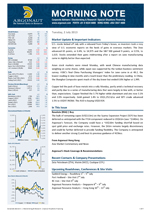Market Update & Important Indicators
Wall Street stocks have ended lower on renewed anxiety over falling oil prices and the rising US dollar. The Dow Jones Industrial Average fell 145.91 points (0.82 per cent) to 17,749.31. The broad-based S&P 500 dropped 12.55 (0.61 per cent) to 2,053.40, while the tech-rich Nasdaq Composite Index declined 21.53 (0.44 per cent) to 4,871.76. US oil prices finished the week below $US45 a barrel after the International Energy Agency warned that rising US crude inventories were approaching the limits of storage capacity amid the global oversupply. The euro got as low as $US1.0466, its lowest level since January 2003. Investors fear the strong US dollar will harm US exports and emerging market economies, analysts said.
European stocks in the eurozone's main markets mostly rose, ending on an optimistic note after the first week of European Central Bank's massive bond-buying program to stimulate growth and ward off deflation. Frankfurt's DAX 30 index gained 0.87 per cent to hit a new record close of 11,901.61 points, while in Paris the CAC 40 climbed 0.46 per cent to 5,010.46 points. Bucking the trend, London's benchmark FTSE 100 index slipped 0.30 per cent to 6,740.58 points due to slumping energy shares. The euro dipped, keeping it on course to reach parity with the US dollar, one day after striking a 12-year low against the greenback. The euro stood at $US1.0512 after striking a 12-year low at $US1.0495 on Thursday.
Asian markets mostly rose following a surge on Wall Street with unexpectedly weak US data tempering talk of an interest rate. Despite the easing expectations, the US dollar maintained its strength against the euro after retreating from Thursday's multi-year highs. Tokyo surged 1.39 per cent, or 263.14 points, to finish Friday at 19,254.25, Hong Kong put on 0.11 per cent, or 25.25 points to 23,823.21 and Shanghai added 0.70 per cent, or 23.59 points, to 3,372.91. Seoul rose 0.77 per cent, or 15.20 points, to close at 1,985.79 but Sydney lost 0.61 per cent, or 35.7 points, to end at 5,814.5.
The benchmark S&P/ASX200 index was down 35.7 points, or 0.61 per cent, at 5,814.5 points. The broader All Ordinaries index was down 28 points, or 0.48 per cent, at 5,788.0 points. The Australian market looks set to open lower after Wall Street fell on renewed anxiety over falling oil prices and the rising US dollar. At 0805 AEDT on Monday, the March share price index futures contract was down 11 points at 5,801. In local economic news on Monday, Reserve Bank of Australia assistant governor for financial markets Guy Debelle is slated to deliver a speech at the KangaNews DCM Summit.
World oil prices have sunk after the International Energy Agency warned that US crude inventories are nearing storage capacity amid a global oversupply. US benchmark West Texas Intermediate for April lost $US2.21 to close at $US44.84 a barrel on the New York Mercantile Exchange. In London, the global benchmark, Brent North Sea crude for April delivery, settled at $US54.67 a barrel, down $US2.41 from Thursday's closing level. The Paris-based IEA warned that US crude output "so far shows precious little sign of slowing down. Quite to the contrary, it continues to defy expectations".
Metals ion the LME were mostly up with the exception of Lead. Copper rose 0.3% to US$5,882/t and Nickel 1.7% to US$14,080/t. Gold was up 0.5% to US$1159/oz while Brent fell 4.2% to US$54.67/bbl.
Thought for the day – OPEC
Introduction
Through co-ordination of production, the Organisation of Petroleum Exporting Countries (OPEC) stands as the single most important supply-side influence in global oil and energy markets. Accounting for around 42% of world oil production but over 55% of the oil traded internationally, OPEC has substantial influence over the direction of crude pricing given that the countries that comprise OPEC account for almost 80% of the world’s proven oil reserves. At its simplest, OPEC effectively works as a supply-side swing, with the members seeking to co-ordinate their production through periodically agreed production allocations thereby ensuring that the market for oil remains roughly ‘in balance’ at a particular price band.
A brief history
OPEC describes itself formally as a permanent, inter-governmental organisation which was created in September 1960 by five founding members; Iran, Iraq, Kuwait, Saudi Arabia and Venezuela. These five were later joined by nine other members namely Qatar (1961), Indonesia (1962 albeit suspended in 2009), Libya (1962), the UAE (1967), Algeria (1969), Nigeria (1971), Ecuador (1973), and Gabon (1975-94) although subsequent years saw these two latter members, both of whom were only modest oil producers, suspend their membership of the organisation. In 2007 Angola was admitted to OPEC and Ecuador ended its suspension today’s OPEC thus comprises 12 members.
Opec’s Charter
Headquartered in Vienna, Austria OPEC’s objective from the start has been ‘to coordinate and unify petroleum policies among member countries in order to secure fair and stable prices for petroleum producers; an efficient, economic and regular supply of petroleum to consuming nations; and a fair return on capital to those investing in the industry’. Through the early years of the organisation, limited co-ordination between the members and the ongoing dominance of the international oil companies (IOCs) meant that OPEC’s influence on oil markets and pricing was modest. Indeed, the presence of the IOCs through production concessions in many member countries meant that OPEC’s ability to influence production quantities was somewhat limited.
However, angered by the low price of oil in the early 1970s and a belief that the production policies used by the international majors were resulting in minimal returns for the countries within whose borders crude reserves lay, the member countries started to renationalise their oil assets and flex their collective strength. Moves by Libya to oust BP in 1971 were soon followed by similar initiatives amongst other producing nations.
1973 and the Yom Kippur War
Indeed, this recognition culminated in 1973 when, in response to US support for Israel in the Yom Kippur War, the Arab nations enacted an embargo on oil exports to the US. The result was sudden and devastating with oil prices broadly quadrupling overnight and an energy-hungry world falling into recession. For perhaps the first time the developed world recognised the power that now vested with the oil producing nations.
Recent Contacts & Presentations
Fertoz (FTZ), Atrum (ATU), Doray (DRM), Perseus (PRU), Avanco Resources (AVB), RTG Mining (RTG), Helix Resources (HLX), Rift Valley Resources (RVY), Saracen (SAR), Anova Metals (AWV), West African Resources (WAF), Commodities Group (COZ), Pioneer Credit (PNC), Matrix (MCE), Austal (ASB), Ausdrill (ASL), TFS Corporation (TFC), Gage Roads (GRB), Austin Engineering (ANG), Buru Energy (BRU)
Please read Argonaut's Important Disclaimers & disclosures
Log in to the client area below to download the full Morning Note PDF


